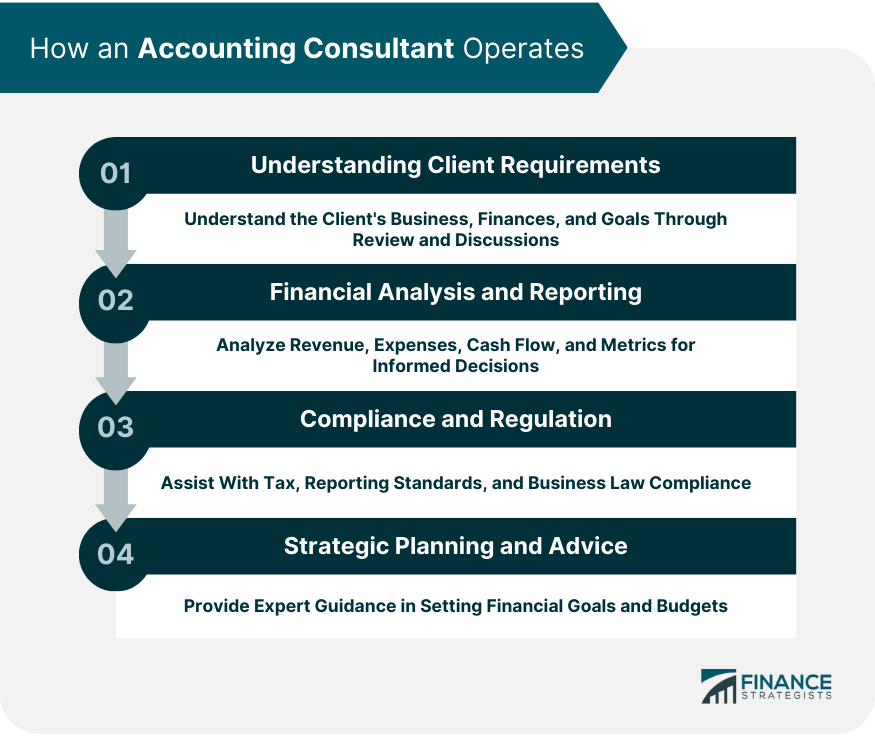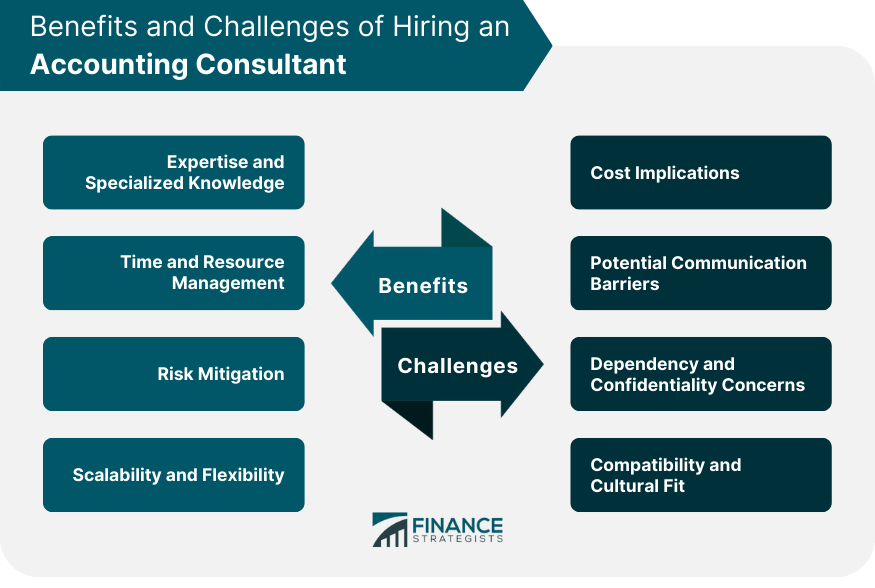An accounting consultant is a trained professional who advises businesses and organizations about their financial affairs. These consultants are typically accredited accountants with a comprehensive understanding of business and finance, and they use this knowledge to offer expert advice and provide valuable services to their clients. The role of an accounting consultant may vary depending on the client's needs. Still, it typically involves analyzing financial statements, developing budgets, providing tax advice, and assisting with financial decision-making. Accounting consultants serve a vital role in businesses of varying sizes and industries. Accounting consultants use specialized knowledge to assist companies in managing financial resources, ensuring legal compliance, and making strategic decisions based on accurate financial information. Before an accounting consultant can provide effective advice or services, they must first understand the client's business operations, financial needs, and long-term goals. This often involves extensive discussions with the client and a thorough review of the company's financial records and business practices. Once they understand the client's requirements, the accounting consultant will conduct an exhaustive financial analysis, examining the company's revenue, expenses, cash flow, and other key financial metrics. This analysis helps the consultant identify areas of strength and weakness within the company's finances, which can guide strategic planning and decision-making. The results of this analysis are often presented to the client in the form of detailed financial reports. Compliance with financial laws and regulations is crucial to any business operation. Accounting consultants help businesses navigate these complex regulatory landscapes, advising on tax preparation, adherence to financial reporting standards, and understanding and complying with relevant business laws. Strategic planning is a vital component of financial management and long-term business success. Accounting consultants use their finance and business knowledge to provide strategic planning services, helping clients set financial goals, develop budgets, and make informed financial decisions that align with their overall business strategy. One of the key benefits of hiring an accounting consultant is the specialized knowledge and expertise they bring to the table. They are well-versed in the latest financial regulations, accounting practices, and industry trends, ensuring businesses can operate efficiently and comply with all necessary rules and regulations. Accounting consultants can also help businesses save time and resources. By taking over complex financial tasks, consultants allow businesses to concentrate on their core operations, which can lead to increased productivity and efficiency. Risk mitigation is another significant benefit provided by accounting consultants. They can identify potential financial risks and recommend strategies to avoid or minimize them, helping businesses avoid costly mistakes and safeguard their financial stability. Accounting consultants offer scalability and flexibility that may take work for businesses to achieve on their own. They can provide their services as needed, allowing businesses to adjust their use of accounting services as their needs change. While there are many benefits to hiring an accounting consultant, businesses must also consider the costs. Professional consulting services can be expensive, and businesses must weigh these costs against the potential benefits before hiring a consultant. Communication is critical when working with an accounting consultant. If communication channels are not clear and compelling, it could lead to misunderstandings and inefficiencies. The business and the consultant must try to establish and maintain open lines of communication. Another challenge is the potential for businesses to become overly dependent on their consultants. This could create problems if the consultant is unavailable when important decisions must be made. Furthermore, since consultants will have access to sensitive financial information, businesses must ensure appropriate confidentiality agreements are in place. The effectiveness of an accounting consultant can also be influenced by their fit with the business's culture and operational style. Businesses should therefore seek consultants who understand and can adapt to their culture and working methods. Businesses should consider the consultant's qualifications and experience when choosing an accounting consultant. This includes their educational background, professional certifications, and their track record with previous clients. Different consultants offer different services and have different areas of expertise. Businesses should understand what a potential consultant specializes in and what services they can provide. Checking a consultant's references and reviews is always a good idea. These can provide valuable insights into the consultant's reliability, competence, and professionalism. Before hiring a consultant, businesses should discuss and agree on fees and terms of service. This can help avoid misunderstandings and ensure the business gets value for its money. Accounting consultants are vital in helping businesses manage their finances, comply with regulations, and make strategic financial decisions. While there can be challenges in hiring and working with a consultant, the benefits typically outweigh the downsides. Businesses can leverage the consultant's expertise to improve their financial management and ultimately achieve their business goals by choosing a consultant who fits their needs and working style. As the field of accounting consultancy evolves, it will be increasingly important for consultants to stay updated on industry developments and continuously enhance their skills and knowledge.What Is an Accounting Consultant?
How an Accounting Consultant Operates
Understanding Client Requirements
Financial Analysis and Reporting
Compliance and Regulation
Strategic Planning and Advice

Benefits of Hiring an Accounting Consultant
Expertise and Specialized Knowledge
Time and Resource Management
Risk Mitigation
Scalability and Flexibility
Challenges and Limitations of Hiring an Accounting Consultant
Cost Implications
Potential Communication Barriers
Dependency and Confidentiality Concerns
Compatibility and Cultural Fit

Selecting the Right Accounting Consultant
Evaluating Qualifications and Experience
Understanding Services and Specialties
Checking References and Reviews
Negotiating Fees and Terms
Conclusion
Accounting Consultant FAQs
Accounting consultants offer financial advice and services to businesses, including financial analysis, budgeting, and tax advice.
Accounting consultants are crucial in managing finances, ensuring compliance, and making strategic decisions based on accurate information.
By handling complex financial tasks, consultants allow businesses to focus on core operations, increasing productivity and efficiency.
Evaluate their qualifications, experience, specialized services, and references to find a consultant compatible with your business.
Technology and automation are increasing efficiency in accounting tasks, making consultants with adaptability and niche expertise valuable.
True Tamplin is a published author, public speaker, CEO of UpDigital, and founder of Finance Strategists.
True is a Certified Educator in Personal Finance (CEPF®), author of The Handy Financial Ratios Guide, a member of the Society for Advancing Business Editing and Writing, contributes to his financial education site, Finance Strategists, and has spoken to various financial communities such as the CFA Institute, as well as university students like his Alma mater, Biola University, where he received a bachelor of science in business and data analytics.
To learn more about True, visit his personal website or view his author profiles on Amazon, Nasdaq and Forbes.











